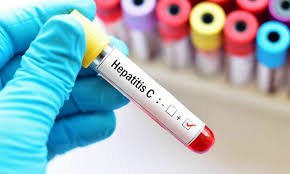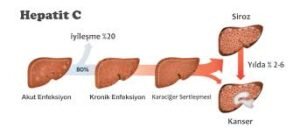Hepatitis C
Hepatitis C is a viral disease that fundamentally affects the liver. Hepatitis C is caused by hepatitis C virus (HCV). The disease can lead to both acute and chronic forms of hepatitis. The acute stage is frequently asymptomatic, and even if symptoms appear, they are generally mild and can include fatigue, fever, muscle and joint aches, and nausea. Mostly people with severe hepatitis c do not experience notable symptoms.
The more prominent concern is the improvement of chronic hepatitis C, as it can prompt more serious liver issues over the long haul. Chronic hepatitis C is a main source of liver cirrhosis, liver cancer, and liver failure.
Table Of Contents:
- How hepatitis C is transmitted.
- Symptoms.
- Diagnosis.
- Treatment.
- Prevention.
How hepatitis C is transmitted:
Hepatitis C is sent by direct contact with infected blood, or indirect contact with an infected object. The virus can also be transmitted sexually, but the risk is low. Infection with the hepatitis C virus is therefore often due to:
- Sharing of equipment for injecting or sniffing drugs, such as syringes, cooking utensils, rinsing water, filters and sniffing tubes.
- Transmission from infected mother to child during pregnancy and birth.
- Contaminated blood products (which have not been examined/tested for infection).
- Treatment (including dental treatment) with non-sterile surgical instruments.
- Injections with syringes or surgical instruments.
Other blood contact, such as when sharing shaving items or a toothbrush, or tattooing or piercing in poor hygienic conditions. - Among men who have sex with men when sexual practice can cause mucosal damage in the rectum or anus.
The disease is usually spread by sharing equipment for injecting drugs.

Symptoms:
Hepatitis C can cause mild symptoms such as fatigue, fever and nausea, but many are completely symptom-free. Still others find that the symptoms come and go.
Typical symptoms of hepatitis C with liver damage are:
- Yellowing of the skin and the whites of the eyes (jaundice).
- Dark urine.
- Discolored stools.
- Pain in the upper right part of the abdomen.
- Loss of weight.
- Loss of appetite.
If symptoms develop, a doctor should be contacted.
The probability of getting symptoms is greatest if the infection has lasted a long time and caused liver damage. If the hepatitis C virus keeps destroying the liver over a long period of time, the symptoms can become more severe.

Diagnosis:
Precise finding is urgent for powerful administration of Hepatitis C. Blood tests, for example, the HCV immunizer test and the HCV RNA test, are regularly utilized to affirm disease. Early discovery through routine screenings is basic, as it takes into consideration opportune mediation and lessens the gamble of entanglements.
Treatment:
Treatment for hepatitis C is viable, present moment and safe. The treatment typically goes on for 8 – 12 weeks, and more than 95% of those treated dispose of the infection, and are in this way thought to be restored. The vast majority experience no or just gentle secondary effects, like weariness. After fruitful treatment, you can never again taint others.
The wellbeing and viability of getting pregnant ladies decrease mother-to-youngster transmission has not been examined and is subsequently not suggested. Finished treatment doesn’t give insurance against being tainted once more in the event that you go on with unsafe way of behaving.
In the event that you are among the people who have created cirrhosis in the wake of being tainted with hepatitis C for a long time, a liver transfer might be vital. This is a significant activity, yet it can save the existences of individuals with serious liver harm.
At times, the specialist will suggest that patients who have had hepatitis C take immunizations that safeguard against hepatitis An and hepatitis B. Assuming you are now tainted with these infections, notwithstanding hepatitis C, this can speed up harm to the liver.

Prevention:
There is no vaccine to prevent hepatitis C. The most effective way to prevent hepatitis C is by keeping away from ways of behaving that can spread the infection, particularly infusing drugs with non-sterile infusion hardware. Hepatitis C can spread when an individual comes into contact with blood from a tainted individual. Infusing drugs is the most widely recognized way HCV is sent in the US. For individuals who infuse drugs, local area based counteraction programs, for example, medicine helped treatment and needle administrations programs, can decrease the transmission of HCV.
Although the risk of sexual transmission of HCV is considered to be low, avoiding unprotected sexual exposure by using condoms has been shown to reduce the chance of sexually transmitted infections.

